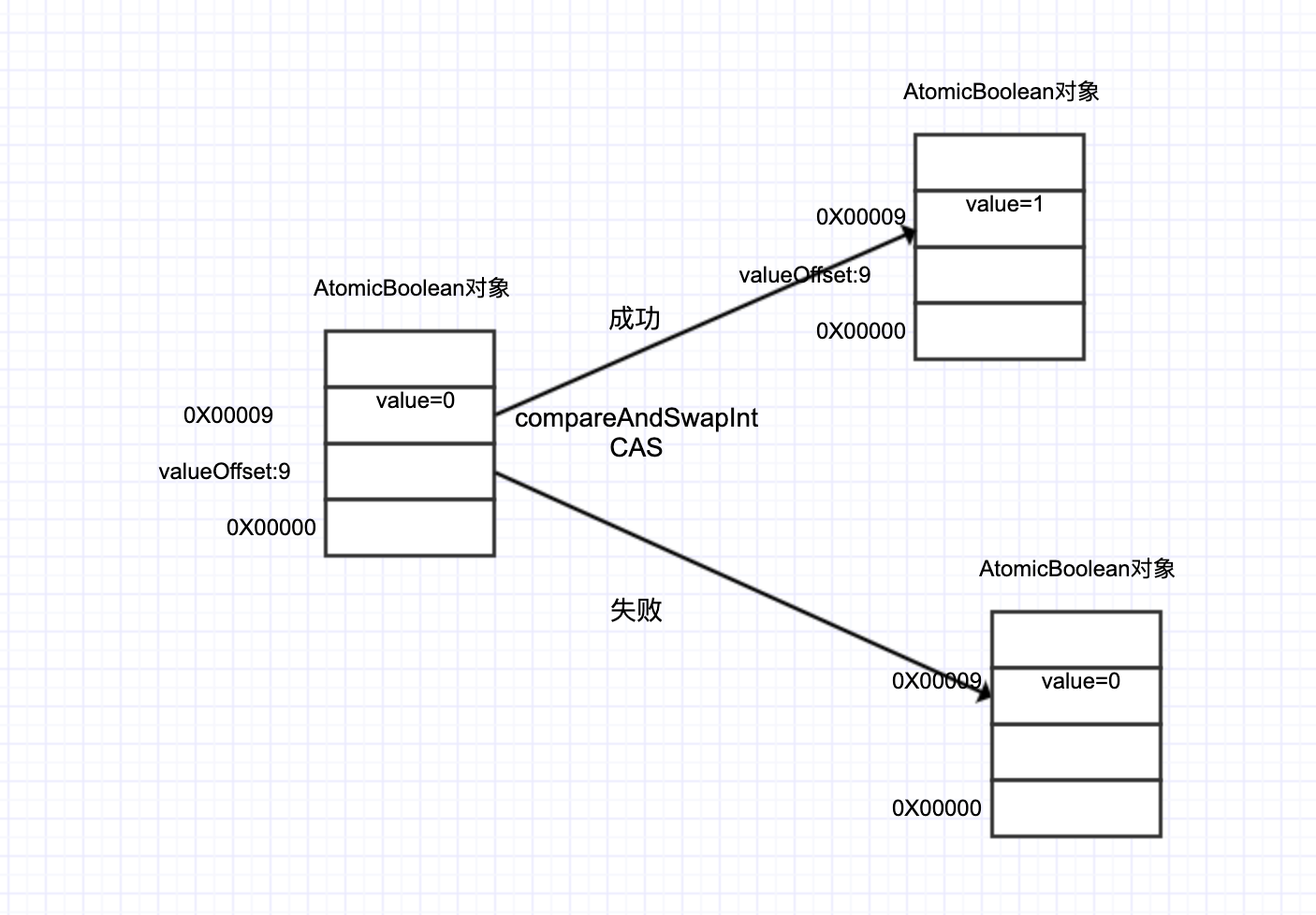- Basic Classes:
- AtomicInteger
- AtomicLong
- AtomicBoolean
- Array type:
- AtomicIntegerArray
- AtomicLongArray
- AtomicReferenceArray
introduce
Since changes to shared variables can easily cause data inconsistencies under multithreaded conditions, there are several ways to ensure thread security for shared variables:
- Use lock or synchronized to synchronize shared variables
- Use CAS method to ensure that modified variables are atomic
This class is the latter and is atomistic based on CAS modification.
Implementation Principle
- Converts a true in boolean to an int type representation: 1 for true 0 for false
- Gets the memory address of the value when the class is initialized
- Calling the Unsafe.compareAndSwant method changes the value through CAS principles (the cmpxchg directive in the CPU)

Characteristic
- Thread Security Based on CAS
- Cloneable interface is implemented and can be cloned
- Serializable interface implemented to support serialization transfer
Source Parsing
Member variables
private static final long serialVersionUID = 4654671469794556979L;
// setup to use Unsafe.compareAndSwapInt for updates
//cas using unsafe class
private static final Unsafe unsafe = Unsafe.getUnsafe();
//Get the value offset (address in memory)
private static final long valueOffset;
/**
* Use int internally for boolean settings
* Default 0
*/
private volatile int value;- serialVersionUID: Serialized ID
- unsafe: This class is the core class in Atomic and is used to perform low-level, memory manipulation, and internal native methods
- valueOffset: Memory offset address of field value
- Value: true value,1 true 0 false, volatile to ensure memory visibility
Class initialization process
static {
try {
//Returns the offset of the object member property from the memory address of this object
valueOffset = unsafe.objectFieldOffset
(AtomicBoolean.class.getDeclaredField("value"));
} catch (Exception ex) { throw new Error(ex); }
}
The main way to get a value-worth memory offset address is through the unsafe method
Member Method
get()
Get the boolean variable
/**
* Return current value
*/
public final boolean get() {
return value != 0;
}boolean compareAndSet(boolean expect, boolean update)
Comparing before and after assignments, assignment failures may occur
/*
* Relevant values are updated only when the expected value is expect
* 1. Expected value equal to present value, assign successfully, return true
* 2. If the expected value is not equal to the present value, the assignment fails and false is returned
*/
public final boolean compareAndSet(boolean expect, boolean update) {
int e = expect ? 1 : 0;
int u = update ? 1 : 0;
return unsafe.compareAndSwapInt(this, valueOffset, e, u);
}- Convert boolean to int type
- Call compareAndSwapInt for CAS assignment
- Returning true indicates success and false indicates failure
boolean getAndSet(boolean newValue)
Assigning values after comparing them uses relatively more
public final boolean getAndSet(boolean newValue) {
boolean prev;
do {
prev = get();
} while (!compareAndSet(prev, newValue));
return prev;
}
- Get the previous value first
- CAS assignment in call to loop compareAndSet
void set(boolean newValue)
Set values unconditionally, using relatively few
public final void set(boolean newValue) {
value = newValue ? 1 : 0;
}
void lazySet(boolean newValue)
It is also an assignment operation that causes Java to insert into the StoreStore memory barrier to avoid reordering write operations
public final void lazySet(boolean newValue) {
int v = newValue ? 1 : 0;
unsafe.putOrderedInt(this, valueOffset, v);
}summary
- This class is an atomic boolean class and is thread safe
- The core operations of this atomic class are based on the Unsafe class
- CAS generally produces ABA problems